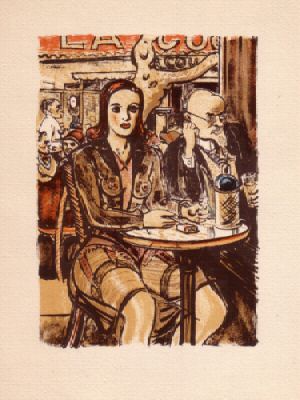I went an' bought some shirts today. Why? Because, damn it all, I needed a couple of casual shirts. So I went to the anemic Briarwood mall in sunny Ann Arbor ("A Squared" we call it here 'round the U of M). So I don't want anything too fancy, that's my problem, all I got is nice shirts, and I walked into this store called "
Hollister." You may be familiar, I was not. The store and the brand itself are imitations of some strange parallel universe California. You know the one...where Orange County contains only Newport Beach and Disneyland (and no minorities) and everybody has natural highlights and deep sense of personal fulfilment and a surfboard. Anyway, I would take odds that I was the only person in the store that had ever actually been to California, and yet here were the young and affluent of Washtenaw County ready to shop and to serve those who would shop. The service was horrible...I mean really, really bad, I could find neither fitting room, nor employee to direct me to a fitting room. When I found a shirt I liked (I found a mirror and just tried it on right there) and went up to purchase it, well there was one dude at the check out and we was clearly out of his weight class. A young woman in front of me had $250 worth of clothes (and let's remember that we are not talking about a good pair of pants, a belt, and a jacket, this is $250 worth of $25 items) and that took a while (because, and I didn't know this, you have to carefully fold the pre-wrinkled tank tops and pre-ripped jeans lest said purchases become mussed in the shopping bag). Two other people were hanging out behind the counter, but were not interested in helping, I don't know what they were doing...mostly talking about a young woman whose boyfriend--named Randy--was not at all a good boyfriend for her. Randy's ears burned this day, that I promise you.
But there was a bright side. They were training the summer hirelings when I was there. And because of their commitment to customer service, they were doing it in the middle of the store directly in front of the cash register and we were forced to line up awkwardly to the side. At any rate, I was privy to the training session and had ample time to look at the posters on the walls, both of which were instructive and just an itsy bit fun.
First off: the posters. Posters appeared on the walls bearing the slogan, "Do You Belong?" which is creepy and judgemental, and fit perfectly with the atmosphere of the store. I found out, after asking, that it was directed at getting a Hollister charge card. But you can see the thinking. It's antagonistic and preys upon the natural insecurities of the teen agers that clearly make up the majority of the clintele (though the models on the posters are clearly my age or older [mid-twenties]). You have to ask to find out that it's about a charge card, the slogan goads kids into doing so, and once asked, odds are the kids are going to sign up, at least those that are most valuable will. The relative benefits of store cards beside (full disclosure, I have a Nordstrom's card) the real gold mine here is for the store who will sell the info on a group that has self-selected as both impressionable and affluent enough to shop there. Think of that what you will.
Next: the training. What struck me about the training (other then having an informational session in the middle of the god-damned store during business hours) was that they made each prospective employee stand on a chair in the middle of the other prospective employees and list their name, where they are from, where they go to school (so far pretty standard--but wait there's more), and then the reason why they want to work there, their favorite CD, and (my hand to god) their
favorite celebrity. Each answer was being evaluated by a young man with a clipboard who was a few years older than the group average. When Clipboard was challenged by a prospective who said that he couldn't come up with a celebrity because he really didn't have a favorite and he thought celebrities were silly, Clipboard responded that the prospective needed to answer the question and that--far from being silly--he was "deadly serious" about it. Needless to say that I disapproved of nearly every answer I overheard. But I'm a snob, so don't listen to me. The important thing was that "favorite celebrity" had become a personal signifier; these kids weren't merely expected, but
required to identify with a famous person as a means of personal evaluation (a troubling twosome mentioned Paris Hilton and laughed, and the others laughed, and Clipboard laughed, and I died a little inside). Individual worth was pegged to pop status. It's important to remember that Clipboard was scoring these responses on a form sheet. It's as though the young prospectives (pledges to the fraternity of Hollister employees?) were not meaningful except as analogies to those whose merit is unquestionable since it arises organically (ha!) out of our collective will. The individual 19-year-old is but a pale reflection of the ideal Platonic (via Jung and Neitzsche) form of Mischa Barton. Ah, Hollister, we see you but through a mirror darkly!
Both the posters and the questions can be explained under the misguided pseudo-California the store aspired to. California, especially the one that exists in the national mind, is all about aspiration and sundrenched beauty and celebrity and the renewal of personal identity. But none of these kids has read a Joan Didion essay, and that's not how the kids in the store meant it. The status here was to be found in the judgement of Clipboard and their peers. Are they good enough to work in the store, are they Hollister material--with all the belonging that entails. The sociology paper will be entitled:
Wither Seth Cohen? Identity in the New California of the Mind.
Then a girl opened a new register and rang up my $16 white cotton button down with green stripes and I left--wondering what (not who) my favorite celebrity might be.
Read more








